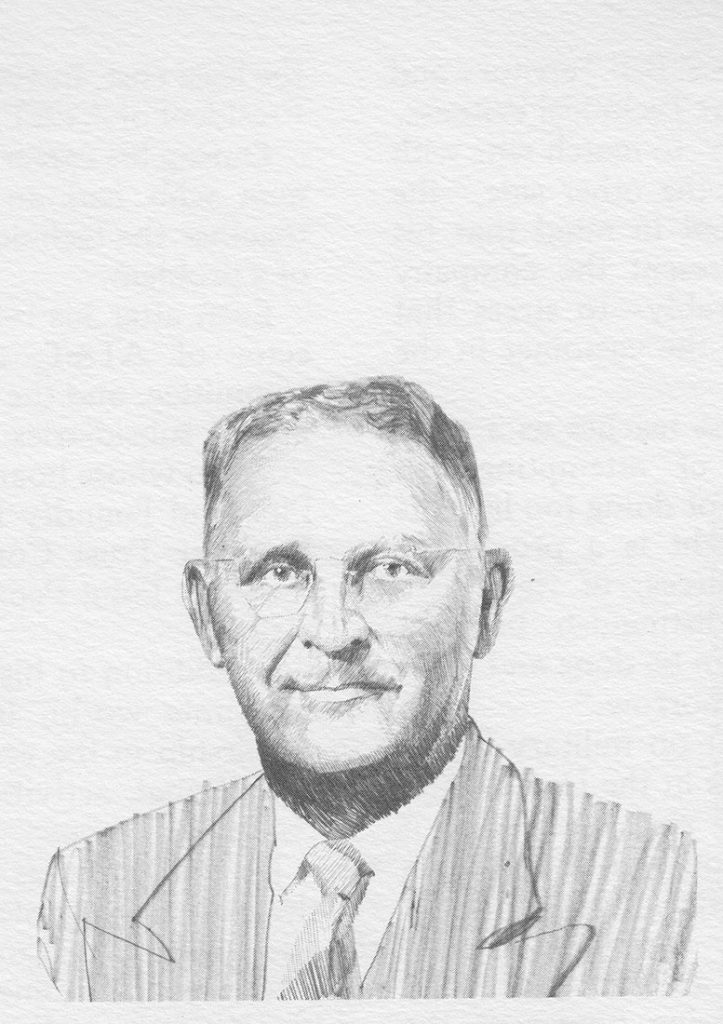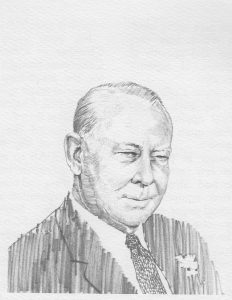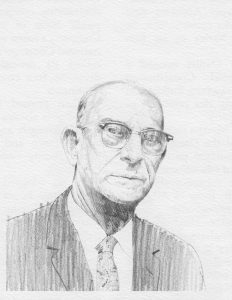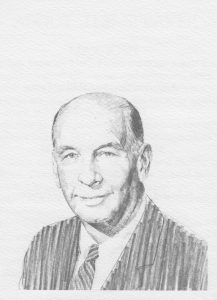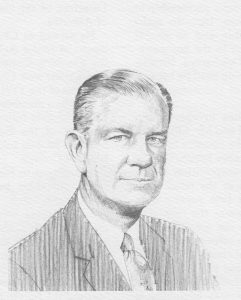It is not possible to think of Stephen D. Steve-Moxley being out of the thick of things. We take his retirement as only a piece of paperwork,” were the opening words of an editorial in the Birmingham News on June 3, 1963, the day Steve Moxley stepped down as President of American Cast Iron Pipe Company (ACIPCO). Indeed, Steve Moxley had always been in “the thick of things.”
For forty years, he had been a major factor in ACIPCO’s “true American enterprise, research and manufacture of an improved product at a better price.” He had also “entered fully into every aspect of the constructive life of Birmingham, the State, and the Nation.” In no small part had his efforts helped bring a new industrial water supply to Birmingham, a full engineering school to UAB, and later the Warrior Tombigbee Waterway to Alabama.
Stephen Dewey Moxley was born in Arnot, Pennsylvania, on June 3, 1898, son of Richard and Elizabeth Ann (Thomas) Moxley who had recently immigrated from South Wales, Great Britain. When he was four, the family moved to Wylam, a suburb of Birmingham, where his father resumed his work as a coal miner and coal mine supervisor.
The fourth of eleven children, young Steve attended Wylam Elementary School and two years at Ensley High School in Birmingham before dropping out at 16 to become an apprentice draftsman at the Tennessee Coal, Iron and Railroad Company (now a part of U.S. Steel). Later, he passed an entrance exam which enabled him to become an engineering student at The University of Alabama. He completed his high school credits by correspondence at Tuscaloosa well after he had enrolled in college.
To finance his college education, he fired the central furnace at The University and worked between terms at TCI. By 1921, he had earned a B.S. degree in Mechanical Engineering, and by 1922, a Master’s degree in the field. While at the university, he led the organization of both Theta Tau and Tau Beta Pi. After graduation, he became a Mechanical Engineer at ACIPCO, the company to which he would give forty years of service.
In 1924, Steve Moxley married Marion Frances Bishop, a native of Marseilles, Illinois, whom he had met at The University of Alabama. The Moxley’s subsequently had three children-Gladys (Mrs. William M. Ikard) of Winchester, Tennessee; Stephen, Jr. of Huntsville, and Thomas C. of Birmingham-and 11 grandchildren.
At ACIPCO, he conceived and designed a number of machines for the production of cast iron pressure pipes by the sand spun process. In 1926, he was named Chief Engineer. Because a totally new process for the manufacture of pipe was being placed in operation, the engineers-with no precedent to follow-had to design all machinery connected with the process “from the ground up.”
Between 1927 and 1935, eight of Steve Moxley’s nine patents were issued. He had been a co-inventor of the centrifugal casting method of producing iron pipe using sand lined molds-a process which was very significant in the success and growth of ACIPCO in its production of superior strength cast iron pressure pipe.
In 1932, The University’s College of Engineering recognized his part in the development and practical application of this process by conferring upon him the degree of Mechanical Engineer. He was an early pioneer in pollution control at a time when few cared about pollution. By 1928 he had already incorporated dust collection equipment at ACIPCO. His 1935 technical paper on dust collection in the foundry-one of at least a dozen technical papers he wrote during his career-became the definitive paper on the subject and was reprinted and distributed for many years thereafter.
In 1937, Steve Moxley was named Assistant to the Vice President in Charge of Engineering, and by 1946 had been promoted to Vice President in Charge of Engineering and Purchases. By 1953, he was named Executive Vice President; and two years later, President and Chief Executive Officer. During his presidency, the corporation in creased in international prominence as a producer of cast iron pipe and other metal products, with sales exceeding $40 million, a goodly percentage of which came from sales of new products first manufactured by ACIPCO under his astute leadership.
In recognition of his professional achievements, Steve Moxley received innumerable awards, such as being named in 1953 a Fellow of the American Society of Mechanical Engineers. In 1966, he was awarded an honorary Doctor of Science degree by his alma mater.
But his contributions to the state and nation extended beyond the professional sphere. The list of his civic, educational, and cultural activities would be as long as the uplifted arm of Vulcan, the statue standing on the mountain above Birmingham. For Steve Moxley was driven by a strong sense of obligation to repay his college, his company, and his community for the success he had achieved.
He was the head of a committee which in 1951 completely equipped Alabama’s Engineering School with one of the most complete foundries at any college. His eight years as Chairman of the Chamber of Commerce Industrial Water Committee brought him “outstanding credit for the attainment of Birmingham’s new industrial water system” and in 1958 he was elected first Chairman of the City’s Indus trial Water Board.
He headed the Business and Industry Division of the capital fund drive that enabled UAB to establish its first degree granting engineering school in Birmingham.
For these and other accomplishments, and for his reputation as a “man who went the extra mile,” Steve Moxley was named Birmingham’s Man of the Year for 1960. Later, as President of the Warrior Tombigbee Development Association, he helped promote the _successful completion of that waterway. He served as a trustee of Southern Research Institute and the Birmingham Symphony Orchestra.
He was a director of Carraway Methodist Hospital, Jefferson County Community Chest, and Junior Achievement of Birmingham. He contributed significantly to the support of the Medical School at the University of Alabama-Birmingham. He was a member of the Board of Stewards at the First Methodist Church.
Steve Moxley told his employees “It is our job to prove that the Golden Rule in the industry is practical” and the “only way to meet a problem is full-on-face-to-face.” To his friends, he often said that whatever success he’d achieved in life, he owed to The University of Alabama and his wife “Bunny.” What others said of him is equally telling-“His incomparable quality is his ability to find the time and energy to do what needs to be done. He does not seem to be able to say No to any worthwhile endeavor or individual.”
Steve Moxley’s continuing involvement ended abruptly on February 22, 1967, as a result of a tragic automobile accident in which four days before, his wife and three others, including his wife’s brother and sister-in-law, had also been killed.
The people and the community he loved and served will long remember this great man and his accomplishments.

